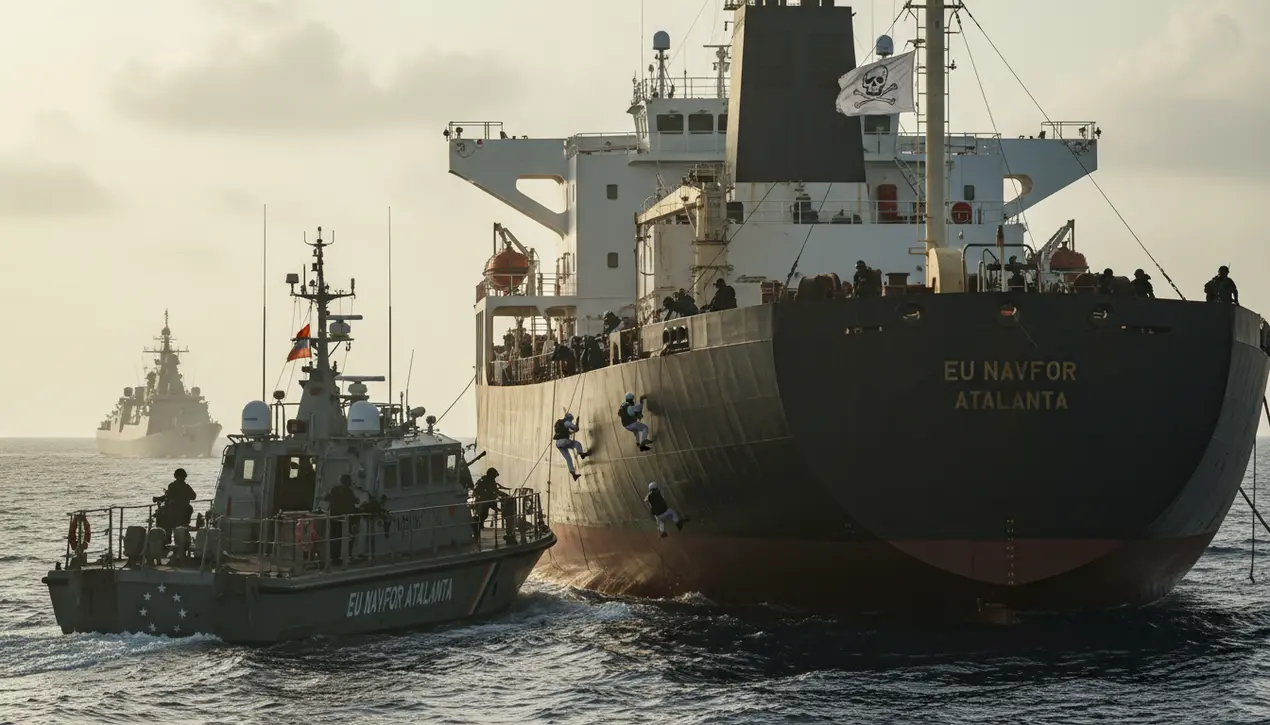
Politicsconflict & defenseMilitary Operations
EU and Indian navies recapture pirate ship after tanker seizure.
OL
Oliver Scott
1 hour ago7 min read
The coordinated naval operation between European Union and Indian forces to recapture a pirate-controlled vessel following the seizure of a commercial tanker represents a significant flashpoint in the ongoing, multi-faceted maritime security crisis proliferating through critical global shipping lanes. This incident, while resolved successfully, underscores a deeply troubling resurgence of Somali-based piracy that had previously been considered largely suppressed after its devastating peak in 2011—a year that, according to the meticulous data from the Oceans Beyond Piracy monitoring group, inflicted a staggering €6 billion drain on the global economy, with €138 million funneled directly to criminal syndicates via ransoms.The strategic recapture is not merely a tactical victory but a critical data point in a complex risk assessment, forcing analysts and shipping conglomerates to recalibrate their threat models for the Gulf of Aden, the Arabian Sea, and the wider Indian Ocean. The collaboration between EU NAVFOR Operation Atalanta and the Indian Navy signals a robust, multilateral response, yet it simultaneously highlights the persistent vulnerabilities of commercial shipping against agile, low-cost asymmetric threats.The pirates' operational playbook has evolved; they now exploit larger captured vessels, so-called 'motherships,' to extend their operational range far beyond the Somali coastline, leveraging a void in coastal state governance and the sheer vastness of the ocean to stage audacious attacks on high-value targets. The seizure of the tanker itself points to a calculated shift towards targeting more lucrative assets, threatening not just crew safety but also regional energy security and international trade flows.The economic calculus is chilling: while the direct cost of ransoms is immense, the indirect costs—including increased insurance premiums, rerouted shipping lanes adding days to voyage times, heightened security contracts, and accelerated naval deployment budgets—can cripple supply chains and inflate consumer prices worldwide. From a political risk perspective, this event must be viewed through the lens of regional instability, where the breakdown of onshore law and order in Somalia continues to provide a fertile recruiting ground for maritime criminal enterprises.Furthermore, the successful counter-operation, while commendable, does not equate to a strategic solution; it is a reactive measure in an enduring game of cat-and-mouse. Scenario planning must now account for the potential convergence of piracy with other illicit networks, including weapons smuggling and terrorist financing, which would dramatically escalate the threat level.The international community's commitment remains tested, as sustained naval patrols are financially draining and politically complex to maintain. The long-term consequence of inaction, or even a slight reduction in vigilance, is a near-certain return to the lawless conditions of 2011, where freedom of navigation was directly challenged, and the very arteries of global commerce were under constant siege. This incident serves as a stark reminder that maritime security is a continuous, dynamic challenge requiring not just military might but also comprehensive strategies addressing the root causes of poverty, instability, and impunity on land.
#Somali piracy
#EU navy
#Indian navy
#maritime security
#Malta-flagged tanker
#featured
Stay Informed. Act Smarter.
Get weekly highlights, major headlines, and expert insights — then put your knowledge to work in our live prediction markets.
Comments
Loading comments...
© 2025 Outpoll Service LTD. All rights reserved.